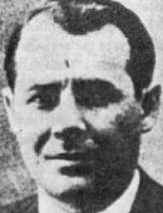<Back to Index>
- Boss of Bosses Salvatore Maranzano, 1886
PAGE SPONSOR

Salvatore Maranzano (July 31, 1886 – September 10, 1931) was an organized crime figure from the town of Castellammare del Golfo, Sicily, and an early Cosa Nostra boss in the United States. He instigated the Castellammarese War to seize control of the American Mafia operations, and briefly became the Mafia's "Boss of Bosses". He was assassinated by a younger faction led by Lucky Luciano, who established a power sharing arrangement rather than a "boss of bosses" to prevent future wars.
As a youngster, Maranzano had wanted to become a priest and even studied to become one, but later became associated with the Mafia in his homeland. Maranzano had a very commanding presence, and was greatly respected by his underworld peers. He had a fascination with Julius Caesar and the Roman Empire and enjoyed talking to his less educated American Mafia counterparts about these subjects.
Maranzano emigrated to the United States in 1925, settling in Brooklyn. While building a legitimate business as a real estate broker, he also maintained a growing bootleg liquor business.
Maranzano began to invade the territory of Joe "The Boss" Masseria. Maranzano hijacked truckloads of Masseria's liquor and started taking over Masseria's speakeasies. This led to a bloody underworld battle known as the Castellammarese War. While outnumbered at the outset of the war, Maranzano and his fellow Castellamarese grew stronger as the war progressed. The war ended after one of Masseria's lieutenants, Charles "Lucky" Luciano, helped orchestrate Masseria's murder in April 1931 in return for being considered an equal to Maranzano.
Maranzano was now the most powerful gangster in New York. Two weeks after Masseria's murder, Maranzano called together several hundred Mafiosi at a banquet hall at an undisclosed location in Upstate New York. Maranzano laid out his vision of a new gangland, structured on hierarchical lines. The New York Mafia would be organized into Five Families, headed by himself, Luciano (his second - in - command), Profaci, Vincent Mangano and Thomas Gagliano. In addition, Maranzano created a special position for himself — Boss of All Bosses.
Maranzano also laid rules for a Mafia Commission; among other things, he outlawed random killings, and he prohibited anyone in The Commission from talking about the Mafia or its activities to anyone outside, even if the outsider was just the gangster's wife. Anyone who broke any of these rules would be punished by death.
To signal his dominance to the nation's other crime bosses, Maranzano called a meeting in Wappingers Falls, New York, to tell Al Capone and other influential mafiosi nationwide that he was now the leader of New York Mafia operations.
However, Maranzano's scheming, his arrogant treatment of his subordinates, and his fondness for comparing his organization to the Roman Empire (he attempted to model the organization after Caesar's military chain of command) did not sit well with Luciano and his ambitious friends, like Vito Genovese, Frank Costello and others. Luciano came to believe that Maranzano was more power hungry than Masseria had been. Despite his advocacy for modern methods of organization, including capos overseeing crews that did the bulk of the families' work, many younger mafiosi resented him as a "Mustache Pete" — an old - school mafioso too steeped in Old World ways. For instance, he was opposed to Luciano's partnership with Jewish gangsters such as Meyer Lansky and Bugsy Siegel. In fact, Luciano and his colleagues had intended all along to bide their time before getting rid of Maranzano as well.
Maranzano
realized this soon enough, and began planning the murder of Luciano,
Genovese, Costello and others. Maranzano did not act quickly enough,
though: by the time he hired Mad Dog Coll to murder Luciano and Genovese, Luciano, aided by Meyer Lansky, had already found out about Maranzano's plans.
Luciano arranged for Samuel "Red" Levine and three other gangsters provided by Lansky to go to Maranzano's offices on September 10, 1931, posing as police detectives. Once inside his office on the 9th floor of The Helmsley Building, they disarmed Maranzano's guards. The four men then shot and stabbed Salvatore Maranzano to death. As they fled down the stairs, they met Coll on his way upstairs for his appointment with Maranzano. They warned him that there had been a raid, and he fled too.
Following Maranzano's death, Luciano and his colleagues reorganized the Five Families and abolished the position of "capo di tutti capi." Maranzano's crime family was inherited by Joseph Bonanno and became known as the Bonanno family.
Maranzano and his wife Elisabetta (who died in 1964) are buried in Saint John's Cemetery, Queens, located in New York City, near the graves of Luciano and Genovese.
- Maranzano plays a small fictionalized role in Mario Puzo's The Godfather. Maranzano refused Don Vito Corleone's proposal to share his monopoly on gambling in New York City, in exchange for police and political contacts and expansion into Brooklyn and the Bronx. Maranzano arranged for two of Al Capone's gunmen to come to New York and finish Corleone. Through his contacts in Chicago, Corleone found out, and sent Luca Brasi to murder the gunmen. With Capone out of the picture, the great mob war of 1933 had begun. Desperate for peace, Maranzano agreed to a sit down in a restaurant in Brooklyn, where he was killed. Afterwards, Corleone called a meeting to reorganize the American Mafia, something that the real life Maranzano did.
- In the 1972 film The Valachi Papers, Maranzano is portrayed by Joseph Wiseman.
- In the 1990 film Mobsters, Maranzano is portrayed by Michael Gambon.
- In the 1999 film Lansky, Maranzano is portrayed by Ron Gilbert.
- In the 1999 Lifetime movie Bonanno: A Godfather's Story, Maranzano is portrayed by Edward James Olmos.
- In the 2011 Torchwood episode "Immortal Sins", Maranzano is portrayed by Cris D'Annunzio.